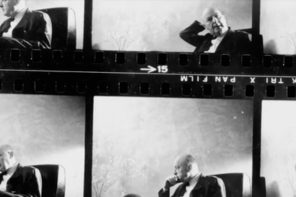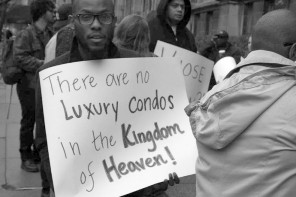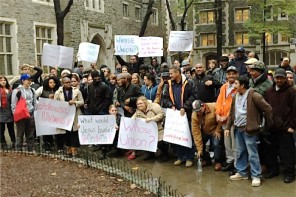“I have never really understood exactly what a ‘liberal’ is,” Assata Shakur writes, “since I have heard ‘liberals’ express every conceivable opinion on every conceivable subject.”
I am prompted to use the words of Shakur in response to the failure of the liberal church—and specifically, of liberal institutions like the one I presently attend, Union Theological Seminary in the City of New York.
And, again, on the subject of the word “liberal,” Shakur is worth quoting at length:
As far as I’m concerned, ‘liberal’ is the most meaningless word in the dictionary. History has shown me that as long as some white middle-class people can live high on the hog, take vacations to Europe, send their children to private schools, and reap the benefits of their white skin privilege, then they are ‘liberal’. But when times get hard and money gets tight, they pull off that liberal mask […]. They feel sorry for the so-called underprivileged just as long as they can maintain their own privileges.
Last week, Chris Hedges wrote a column in which fellow seminarian Robert Stephens and I denounced President Serene Jones’ plan to erect a high-rise luxury condominium building in Union’s main quad. In the piece, I asked the following questions that the Union administration has yet to adequately address:
This is a question about what it means to be a seminary geared to social justice. What does it mean when homeless people are sleeping outside seminary dormitories? What does it mean to worship God and theologize in a world where people are suffering? What does it mean for an institution to thrive in the presence of that suffering? What is the purpose of Union’s existence?
I raise these questions because I sit on the President’s Council on Institutional Diversity and Community Engagement Committee and have been charged with the task of helping to “change the face of Union.” What am I to make of it when “changing the face of Union” means that people of color are represented in classrooms and hallways, but displaced from the surrounding neighborhood of West Harlem? The former is done in the name of promoting ‘diversity,’ while the latter is done in the name of preserving the seminary. Both espouse a capitalist ethic cloaked in liberalism.
Union’s condo controversy is not about who gets the most airtime, who can quote the most theologians, or who has access to ultimate, divinely inspired truth. The condo controversy is about empty vessels and soulless institutions. It is about admitting that the word “liberal” is a hollow placeholder, an empty signifier. The liberal position believes compromises must be made, and that the “good” people—presidents and administrators—making those compromises should be absolved of guilt because they are taking the “sacred middle path,” avoiding all extremes. The condo project at Union is cast as a “difficult” choice between mission and maintenance.
These analyses ignore the reality that gentrification, to which this “sacred middle path” contributes, is an extreme in and of itself. The likely reason for this glaring oversight? The administration and those who defend the condo project are the very people it will not affect: white liberal leaders who view the issue from an economic rather than human perspective.
Shakur wrote that the liberal stands between the staunch right-winger and the ardent leftist. In short, she calls liberals “lukewarm.” One cannot read her words without recalling Revelation 3:16:
So, because you are lukewarm—neither hot nor cold—I am about to spit you out of my mouth. You say, ‘I am rich; I have acquired wealth and do not need a thing.’ But you do not realize that you are wretched, pitiful, poor, blind and naked.
A similar lesson can be gleaned from Matthew 19:16-22, where Jesus sends a young man away because the man is unwilling to sell his possessions and give to the poor. Both passages are damning for those who think themselves either spiritually or materially rich, but fail to recognize their theological poverty. They implore readers to rethink what it means to be rich and suggest true wealth can only be obtained through a process of self-reflection—and more importantly, self-critique.
Is today’s liberalism—and its manifestation in schools like Union—rich in rhetoric but poor in empathy? Are liberals not deceived by their own sense of self-importance and sense of divine duty?
Max Weber, himself ambivalent toward capitalist modernity, provides a helpful insight into how religion can be used toward capitalistic ends.
In The Protestant Ethic and the Spirit of Capitalism, Weber compares Benjamin Franklin with wealthy banker Jacob Fugger. For Weber, the men represent two sides of the same capitalist coin. While Fugger is unapologetically self-interested and uncaring, Franklin imagines his actions as morally praiseworthy.
Weber contends that what characterizes people like Franklin is a belief that their work is the work of God. Franklin quotes and distorts Proverbs 22:9, which reads, “He that hath a bountiful eye shall be blessed; for he giveth of his bread to the poor” (KJV), rendering it in his autobiography as, “Seest thou man vigorous in his vocational calling? He shall stand before kings.” This new capitalist ethic departs from its hedonistic counterparts in that it is not explicitly apathetic and egotistical. It has a form of godliness.
In an article in the New York Times’ real estate section a few months ago (in a column devoted to “untold stories of real estate envy, excess and woe”) President Jones was quoted using language reminiscent of Franklin:
We’re a New York City institution. And we have a New York City-sized problem. But fortunately we also have a New York City-sized answer. God is calling us to have another 100 years, and the air rights are the answer to that call.
Yes, indeed, a call is being answered. But which God has given the call? What’s happening at Union is a microcosm of a broader reality: poor people of color being forced out of their neighborhoods and their homes. Union wants to benefit by tokenizing the people of color who reside within its walls, while at the same time oppressing the people of color living outside its walls.
Most articles have failed to contextualize the Union crisis within a larger framework of socio-economic and theological bankruptcy. President Jones’ open letter announcing her Jubilee Strategic Plan echoes the “Spirit of Modern Capitalism” that Weber names, and it is immoral.
The condo project is consistent with the fact that homeless people are sleeping outside of the seminary; that East Harlem and West Harlem are increasingly economically polarized; and that a household of four making between $100,681-$138,435 is now considered “middle income” in New York City.
Union’s decision to proceed with the condominium project is a decision to ignore a persistent socio-economic crisis. It is a decision to ignore the all-important conclusion of a 2007 affordable housing study from the West Side Federation for Senior and Supportive Housing:
Preservation of the remaining subsidized housing stock in Upper Manhattan is critical to ensure that the existing low and moderate income households of the Upper West Side, Manhattan Valley, and Morningside Heights are not displaced; that housing is available in these neighborhoods for low and moderate income households in the future; and that mixed-income neighborhoods remain a hallmark of the New York City environment.
It also is an affront to students who have spoken out against this injustice. I stand for bodega owners losing their properties in Brooklyn, for the families that lost their homes in the wake of the Barclays Center, and for the men, women, and children of West Harlem who struggle to make ends meet. My fellow students and I fight not because we think we will look righteous doing so. For who can wage a successful PR war against a machine that involves experienced gentrifiers like L + M Development Partners (a firm that, according to critics, does business with anti-union subcontractors), a seminary blinded by its own liberalism, and an administration more concerned with publicity rather than the rightful demands of its students?
Perhaps James Baldwin recognized the futility of such endeavors when he famously said:
It is not too much to say that whoever wishes to become a truly great moral human being … must first divorce himself from all the prohibitions, crimes, and hypocrisies of the Christian church.
I write this because a soulless seminary cannot produce fruit. I write because I know that countless alumni, like Emily Hamilton, who recently vowed to withhold her funding, stand with students who oppose the condo project. I write because I am inspired by Union students who protested a similar project in the late 1980s. I write because the Board of Trustees’ ‘Strategic Plan’ envisions a future of which I am not proud.
My hope is to transform silence into action. Despite the odds being in favor of the capitalist forces of gentrification, I have faith that justice will be done. After all, what good does it do to change the face of Union if the soul of Union is ruined?





